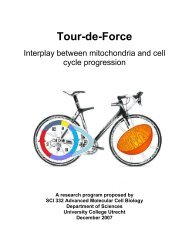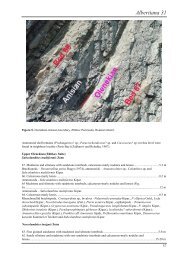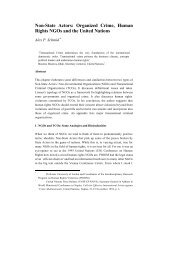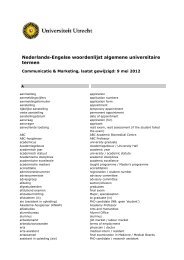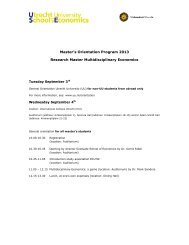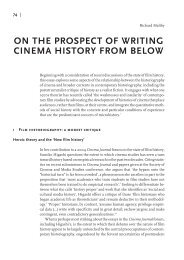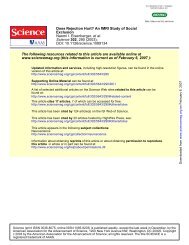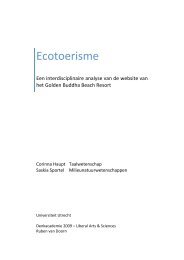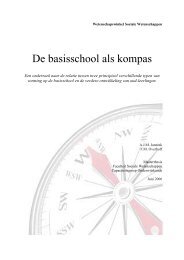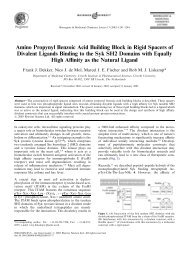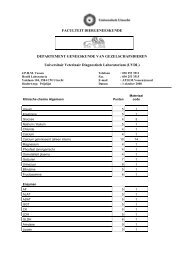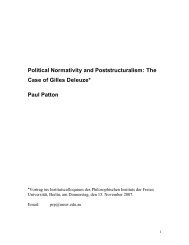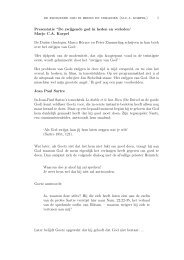Review of the Research Institute for History and - Universiteit Utrecht
Review of the Research Institute for History and - Universiteit Utrecht
Review of the Research Institute for History and - Universiteit Utrecht
You also want an ePaper? Increase the reach of your titles
YUMPU automatically turns print PDFs into web optimized ePapers that Google loves.
B 6. Processes in research, internal <strong>and</strong> external collaboration<br />
According to its mission, OGC produces <strong>and</strong> promotes high-quality research in <strong>the</strong> humanities. To this end,<br />
OGC provides an institutional context <strong>for</strong> <strong>the</strong> exchange <strong>of</strong> ideas between researchers associated with <strong>the</strong><br />
institute, supports <strong>the</strong> interaction <strong>of</strong> its members with researchers outside <strong>Utrecht</strong>, helps initiate new research,<br />
<strong>and</strong> trains young researchers in <strong>the</strong> humanities. The following sections elucidate <strong>the</strong> way <strong>the</strong> different elements<br />
listed here have been put into practice during <strong>the</strong> past eight years.<br />
Planning <strong>and</strong> Control within <strong>the</strong> Programmes<br />
OGC’s 10 research groups <strong>for</strong>mulate <strong>the</strong>ir own research agenda, in consultation with OGC management<br />
<strong>and</strong> <strong>the</strong> national research schools. These have been discussed at length in part A <strong>of</strong> this report. Every OGC<br />
researcher <strong>of</strong> <strong>the</strong> institute is subsumed under one <strong>of</strong> <strong>the</strong> ten programmes. Over a fi ve-year planning period<br />
OGC guarantees a specifi ed number <strong>of</strong> PhD positions <strong>for</strong> each programme. This number is <strong>for</strong>mally agreed<br />
with <strong>the</strong> national research schools. Monitoring <strong>and</strong> assessment <strong>of</strong> research outcomes take place in a variety<br />
<strong>of</strong> contexts. (1) The chairs have primary responsibility <strong>for</strong> <strong>the</strong> contents <strong>and</strong> quality <strong>of</strong> <strong>the</strong> research within<br />
<strong>the</strong>ir group. Every year, <strong>the</strong> chairs should have a so-called task assessment interview (resultaat- en ontwikkelingsgesprek)<br />
with each individual member in <strong>the</strong>ir group, which also covers research output <strong>and</strong> planning.<br />
PhD-projects are monitored by chairs, in <strong>the</strong>ir capacity as supervisors, as well as by <strong>the</strong> OGC PhD-consultant<br />
<strong>and</strong> management. (2) The great majority <strong>of</strong> faculty (permanent <strong>and</strong> temporary) participate in national<br />
research schools. Every fi ve years, <strong>the</strong> ECOS (Evaluation Committee <strong>of</strong> <strong>Research</strong> Schools) committee <strong>of</strong> <strong>the</strong><br />
Royal Dutch Academy <strong>of</strong> Sciences evaluates <strong>the</strong>ir quality. (3) Since 1997, research data (input <strong>and</strong> output)<br />
have been registered in METIS, a nationwide research database. Every year, OGC publishes an annual report<br />
that includes all research results <strong>and</strong> activities.<br />
Collaborative activities<br />
The broad area <strong>of</strong> research covered by OGC enables researchers <strong>of</strong> <strong>the</strong> various programmes to participate<br />
in joint activities. The Scenarios <strong>for</strong> <strong>the</strong> Humanities programme (1999-2003) was deliberately conceived<br />
to stimulate such collaboration across programme boundaries. The programme aimed to contribute to <strong>the</strong><br />
debate on <strong>the</strong> current state <strong>and</strong> societal role <strong>of</strong> <strong>the</strong> humanities. The University Board subsidized this programme<br />
with a total <strong>of</strong> 455,000 euro <strong>for</strong> a period <strong>of</strong> fi ve years. Within <strong>the</strong> framework <strong>of</strong> this programme<br />
OGC research groups worked on such <strong>the</strong>mes as The Challenge <strong>of</strong> Modernity, Managing Art <strong>and</strong> Architecture as<br />
Representations <strong>of</strong> <strong>the</strong> Past, Mediated Cultures, Emancipating Cultures. Within <strong>the</strong> programme fi ve PhD –projects<br />
were initiated, eight symposia <strong>and</strong> masterclasses were organized, <strong>and</strong> faculty was supported to apply <strong>for</strong> NWO<br />
funding. This programme has, however, also hinted at <strong>the</strong> limitations <strong>of</strong> such interdisciplinary work. The<br />
most interesting results, at <strong>the</strong> end <strong>of</strong> <strong>the</strong> day, were still achieved within traditional disciplinary contexts. A<br />
structural collaboration between various disciplines requires much time <strong>and</strong> ef<strong>for</strong>t. Needless to say, OGC will<br />
continue to promote interdisciplinary research. Indeed, <strong>the</strong> Humanities <strong>Research</strong> Center that we hope to set<br />
up in <strong>the</strong> near future will not only aim to bring more visiting researchers to <strong>Utrecht</strong>, but should also provide<br />
a stimulus <strong>for</strong> interdisciplinary debates <strong>and</strong> collaborative work.<br />
The BINT research programme (on Dutch Trade <strong>and</strong> Industry in <strong>the</strong> 20 th Century) is a collaboration<br />
between <strong>the</strong> Universities <strong>of</strong> Eindhoven (TUE), Rotterdam (EUR), Amsterdam (UvA), <strong>Utrecht</strong> (UU) <strong>and</strong> <strong>the</strong><br />
International <strong>Institute</strong> <strong>of</strong> Social <strong>History</strong> in Amsterdam (IISG), <strong>and</strong> is coordinated by OGC.<br />
European Projects<br />
The Gender Studies programme <strong>of</strong> OGC has been particularly active, <strong>and</strong> successful, in applying <strong>for</strong><br />
European Union funding.<br />
• The research projects Employment <strong>and</strong> Women’s Studies: The Impact <strong>of</strong> Women’s Studies Training on Women’s<br />
Employment in Europe <strong>and</strong> Gender <strong>and</strong> Relationships in Europe at <strong>the</strong> turn <strong>of</strong> <strong>the</strong> Millennium: Women as subjects in<br />
Migration <strong>and</strong> Marriage were fi nanced by <strong>the</strong> European 5 th framework programme.<br />
• Under <strong>the</strong> 6 th Framework programme, <strong>the</strong> OGC Gender Studies programme has participated in Cliohres<br />
(New Historical <strong>Research</strong> <strong>for</strong> Citizens in a Growing Europe, (http://www.cliohres).<br />
373 <strong>Research</strong> <strong>Institute</strong> <strong>for</strong> <strong>History</strong> <strong>and</strong> Culture OGC<br />
11



